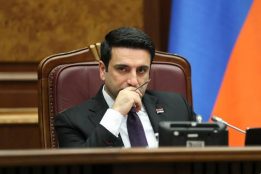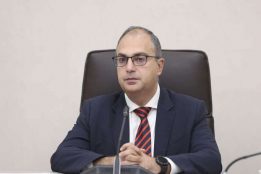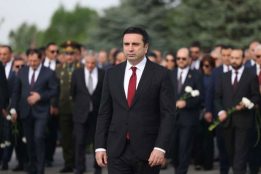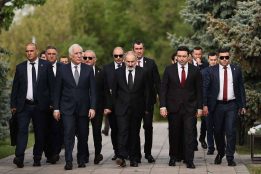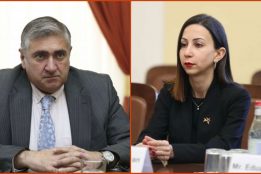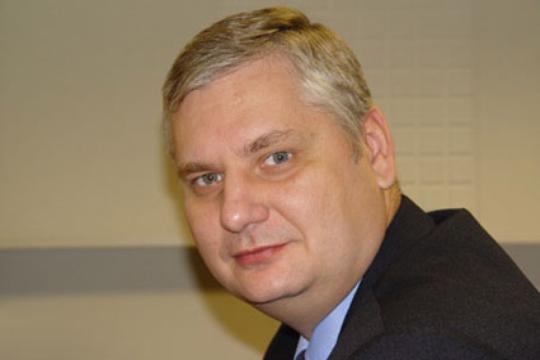
CSIS visiting fellow and analyst of Russian origin Sergey Markedonov published an article in politcom.ru analyzing the so-called Safarov Affair. The article is part-selectively translated from Russian and presented below.
How dangerous is the new political scandal for the Great Caucasus? Does it mean the collapse of hopes for progress in the peace process and achievement of a compromise between Baku and Yerevan? For answers to these questions it would be expedient to deconstruct some of the myths that have developed around the Nagorno-Karabakh peacemaking. It would be extremely useful for understanding at what point is the peace process itself, and what expectations can be realistic, on the contrary, overestimated. This work is extremely difficult, as it forces to put aside almost inevitable emotions. Nevertheless, it is extremely necessary, if the purpose is the understanding of the most difficult ethno political conflict, instead of concerning need of the peace decision.
First, it should be recognized that the parties involved in the conflict are not ready for peace, if under which to understand not a victory of someone one, but the compromise solution. And, by negotiating, they do not think about “eternal peace”, but about the protection and promotion of the currently available political interests and positions. Those formulas that are now offering intermediaries (OSCE Minsk Group) are not sufficiently well-developed. Many critical issues are simply hidden by beautiful rhetoric and evasive statements. Moreover, in “The updated Madrid principles” both Baku, and Yerevan see interest of the U.S., Russia, the EU and even Turkey (because often forced acceleration of the peace process Turkish direction is dictated by Russian, American or European politics), but do not see their own. And the case with Safarov is a superfluous reason for demonstration of such unavailability. Perhaps we can talk about that Heydar Aliyev would not make such a step as pardon (convicted by representatives of the U.S. administration, and a number of influential social and political figures). However it is necessary to recognize that the predecessor of the incumbent president had no need to show the brutality and to play “patriotism” once again. Ilham Aliyev has such requirement. Especially considering the fact that in 2013 he will have difficult presidential campaign, in which he will participate in accordance with the constitutional amendments allowing him to hold the post of head of state, without limiting the number of legislatures. Some commentators called Serzh Sargsyan’s reaction “excessive” and “disproportionate.” But the president of Armenia has rather similar reasons. He also will be elected next year, and he also cannot and does not want to lose the monopoly on patriotism. If he is not so rigid in its relation to the decision of the Hungarian government, his opponents will surely take advantage of it. As a result, the case with Safarov gives the parties the opportunity to delay the peace process, which is largely imposed from the outside. It is deprived of strong internal public support and moves ahead by the intermediary countries in many respects against the subjective desires of the parties.
Yes, today Baku (first of all as a defeated party) doesn’t possess resources for a quick military victory. Otherwise the threats, repeatedly verbalized by Ilham Aliyev and Safar Abiyev, would have already been implemented. But Azerbaijani diplomacy can use the entire arsenal of tools available to torpedo undesirable conditions. Including glorification of Safarov (although is there much heroism in the murder of a sleeping person, even if the enemy?). Isn’t it cynical? Sure. But everyone in Baku understands that a flurry of emotions will pass, passions will settle, as it already happened many times (the presidential elections in 2003, the constitutional amendment to extend the authority for the first person), and everything will be again “constructive and mutually advantageous”. As rightly pointed Azeri political scientist Arif Yunusov, “the energy factor plays an important role for the West, and he is quite satisfied with the fact that the situation in Azerbaijan is stable and there is no interference in the supply of energy.” Yunusov cites a private opinion of one of Western ambassadors in his famous book “Azerbaijan in the early twenty-first century”: “Why do you need a democracy, if you have oil?” So it is not worth to count on the international obstruction in connection with «Safarov’s case». By the way, it is not the first year for Baku to carry out excellently the policy of “swing”. And in case of dissolution with the West, the Azerbaijani leadership knows which capital can without democratic checks and examinations recognize and accept the current government of Baku. Questions of “international image” can excite idealistic defenders, but the leadership of the Caspian republics knows its strengths and weaknesses. It remembers the international law in the discussions on Nagorno-Karabakh, but not in the context of officer Safarov’s extradition. Also understands that while there are ideas of “alternative energy projects” and “energy security” in Europe (they live along and are well with their creators), it is not necessary to wait for external threats. The threat may come from within, as the socio-political sterilization often does not give the results, on which authors count. But it is completely another story.
Second, do not clearly oppose the alleged “archaic power” and “progressive civil society.” I will not distract from the subject and go into a discussion about sociology. But the society in Azerbaijan and Armenia are also not ready to make concessions and compromises. And the “Safarov’s case” showed it once again. This was also evidenced by surveys devoted to peace, war, and negotiation process. From here is the «archaic behavior» of the authorities, based on today’s public representations. Not in the heads of the dreamers torn off from realities, but those «on the earth». If all that was different, the local wave would have swept those, who formulate national interests of both countries today. And it is not just wipes and washes away anybody, but supports afloat. Over two decades there has not appeared any alternative counter-elite, which would have opposed the current “archaic” to peace progress. The question is only in emphasis. Someone louder and someone quieter, with demonstration nod they join professional fighters for peace and quote the correct words and phrases such as «confidence-building, democracy, stability and security», but insist on the victory of his party. Paraphrasing a well-known “practicing Politian” from the Caucasus, for this reason there is no “other writers” in Baku and Yerevan, who would be engaged in works of other foreign policy doctrines instead of instrumentation of the conflict to meet their goals, both within their own countries and outside. Civil society (i.e. people outside the public sector) is also part of the conflict. It creates many myths, political and historical narratives, and many other things that oppose, rather than unite. Substantially, people who are not involved in the power can afford to be more reckless in the conclusions, because they do not bear the practical responsibility for their words. To understand this one should attend two or three round tables of NGO activists from the two countries. Good cure for illusions!
Third, the “case of Safarov,” like nothing else denies naive and illusory idea that the North Atlantic integration by itself (i.e. without political “maturity” of their own societies, getting rid of nationalist illusions) will solve all problems. One should only lean the roots, and everything will be arranged by itself. Let me remind that the murder of the Armenian officer happened not on a military base near Moscow, but in the training center of NATO. And the Alliance itself, by the way, does not seek to resolve the Nagorno-Karabakh conflict, which had been repeatedly officially stated by its representatives. As it will have to choose in favor of one side, it is extremely important for NATO to maintain good relations both with Baku and Yerevan. No unequivocal choice is made, at least for now. Distracting from purely military component, no external player is able to reconcile the two warring societies, if they do not have rational reasons, instead of abstract verbal husks that peace is better than war.
Translated from Russian: Mari Gasparyan

















